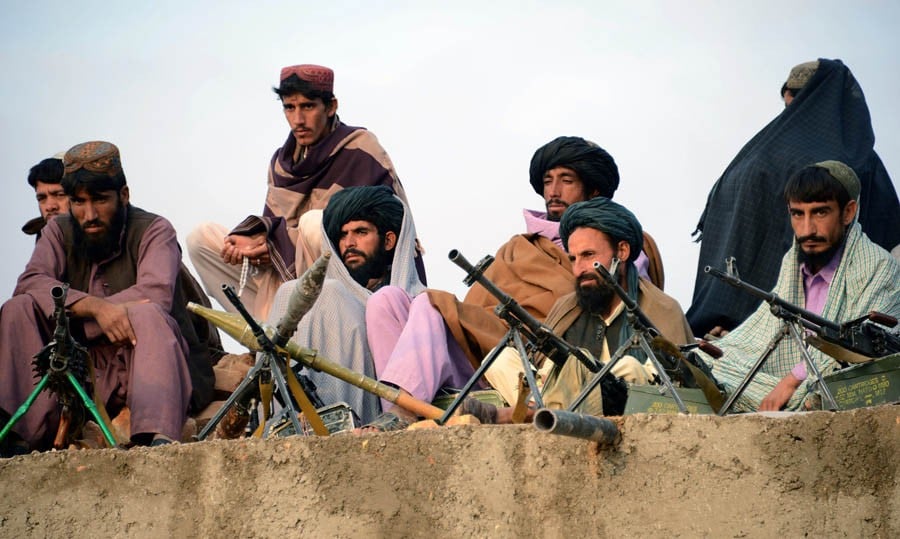
Today’s chaotic Afghanistan is the direct result of imperial machinations spanning centuries

Afghanistan’s problems started soon after the death of its founder Ahmad Shah Abdali (1747-1773). However, problems aggravated during the reign of Zaman Shah, the grandson of Ahmad Shah and son of Timur Shah. He was an ambitious king and wanted to revive the empire of his grandfather. However, his ambitions were frustrated by the more powerful British imperial power. He was caught up in a conspiracy and ultimately blinded by his step brother Mahmud Shah with the help of the powerful sons of Barakzai sardar who was earlier assassinated by Zaman Shah for his alleged part in a conspiracy against him.
For the last two centuries, Afghanistan is caught up in imperial machinations. Since the year 1800 and the rise of Napoleonic France, Afghanistan became a victim of European power politics. Three powers -- Britain, Tsarist Russia, and Napoleonic France -- tried to colonise as many people as they could and checkmate each other in the process. The danger of Napoleon was eliminated in 1815 in the famous Waterloo war.
With Napoleon out of the tournament, the Great Game between Britain and Tsarist Russia began in earnest. In their lust for colonisation, they imposed two unwanted wars on Afghanistan (1839-1842 and 1879-1880). These wars stunted Afghanistan’s progress. Afghanistan’s foreign policy was controlled by the British after the infamous Gandamak Treaty signed and imposed on Amir Yaqub Khan in July 1879. Afghanistan was not only converted into a buffer state but acknowledged as ‘in the British sphere of influence’. Today’s Afghanistan is the direct result of imperial juggernaut that was termed ‘Demarcation without Representation’ by Louis Dupree.
Since the time of Zaman Shah, the British always tried to seek a puppet, weak and dependent regime in Afghanistan but strong enough to control it against internal chaos and turmoil. Besides the two wars, the Durand Line was also imposed on Afghanistan as per the British forward policy in November 1893. This imperial demarcation would become a bone of contention ironically between the two Muslims states. Common bonds and religion didn’t work to find a solution to this contentious issue.
After the birth of Pakistan and the start of the Cold War, relations between Pakistan and Afghanistan worsened. Pakistan joined the US-led alliances Central Treaty Organisation (CENTO) and Southeast Asia Treaty Organisation (SEATO) in 1950s that prompted Soviet Russia to support Afghanistan on the issue of Pakhtunistan. The same issue not only led to the closure of borders but also to suspension of diplomatic relations between Afghanistan and Pakistan in 1961. The closure of border pushed Afghanistan into the lap of Soviet Russia. The neutrality of Afghanistan was mortgaged to Soviet Union that was to be trampled in 1979 in years to come.
The Anglo-Russian Convention in 1907 formally accepted Afghanistan in the British sphere of influence and Amir Habibullah Khan was simply asked to accept it. After suffering enormously in the hidden war of European imperialists, Afghanistan was once again caught up in the vortex of ideological rivalries between the Communist and Capitalist blocks after the 1917 Communist Revolution in Russia. This time the fear of US-led west alliance, including Pakistan, triggered USSR to come and rescue its client regime and placed Babrak Karmal as their man in 1979. For almost ten years the Soviet Union fought a war with the Islamists but had to withdraw under a lopsided Geneva Accord.
The Soviet-backed regime of Afghanistan withstood the onslaughts of Islamists for some three years but eventually gave way in 1992 and the Mujahideen took over. The situation in Afghanistan got gruesome and brutish due to internal ethnic fault lines and external interference by all its neighbours.
In such a chaotic situation a new force by the name of Taliban emerged purportedly with the help of Pakistan or as a counter ethnic force against the depredations of warlords. The intransigent and maverick Taliban imposed a bizarre rule in Afghanistan bringing peace but at the cost of civic liberties. The bonhomie between Taliban and US soon ended when the chief of al Qaeda got refuge in Afghanistan after being expelled from Sudan. The 9/11 event brought about a seismic shift in world politics.
The vacuum created by the Taliban ouster was filled with hastily called and flawed Bonn Agreement. Like Dost Muhammad Khan and Amir Abdu Rahman who were preferred by the British for their own reasons, this time Hamid Karzai was the US choice to rule Afghanistan. However, the US too failed to learn in their seventeen years long war that as long as they stay in Afghanistan, they will be equated with British and Soviets.
An Afghan expert, Burnet Rubin, has aptly stated that Afghanistan is not only the mirror of its people but indeed of the whole world. The world needs to learn from history.